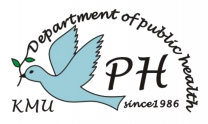KMU Department of Public Health|Program Development & Key Focus
Undergraduate, Master’s, and Doctoral programs — development pathways and strategic emphases
Undergraduate Program
Cultivating public health professionals with broad knowledge, ethical awareness, and career readiness.
Educate competent public health professionals
Grounded in general and liberal arts education, the curriculum builds professional foundations in basic medical sciences and advances through multi-faceted public health knowledge. Core focus areas include health administration & healthcare management, environmental & occupational health, biostatistics & epidemiology, and health promotion & behavioral interventions. Through diverse coursework and certification guidance, students are supported in preparing for national licensure examinations for public health professionals and in expanding career options.
Five-year B.S.–M.S. pathway for outstanding students
As a leading program in Southern Taiwan offering a coherent education from Bachelor to Master and Doctoral levels, we encourage outstanding undergraduates to continue into the Master’s program. The integrated pathway promotes continuous learning, shortens time-to-degree, and is supported by competitive “pre-graduate” scholarships provided by the University.
Multi-track credit programs for the health promotion industry
Health promotion empowers individuals and communities to take control of and improve their health. By integrating health education with organizational, legal, and economic interventions, it helps modify unhealthy behaviors, strengthen preventive services, and foster supportive social and living environments. Preventive health promotion holds strong potential for the health services industry. The department offers diversified tracks and micro-credential practice modules to cultivate health promotion professionals and develop students’ capacity for careers across public-health-related industries.
Master’s & Doctoral Programs
Advancing research capability and solving public health challenges through cross-disciplinary integration and global engagement.
Develop professionals to investigate and solve public health problems
Driven by societal change and economic factors—Westernization of lifestyles, rapid population aging, and increasing healthcare demands—together with growing concerns about environmental pollution and occupational hazards, public health faces new challenges. We therefore train professionals equipped for problem identification, data collection, statistical analysis, and evidence-based solutions.
Integrate diverse domains and align with national health policies and trends
Major human diseases—including infectious and non-communicable diseases (e.g., cancer, cardiovascular disease, diabetes, asthma)—are complex and closely related to environmental exposures, genetic factors, healthcare systems, health behaviors, and national health policies. Our teaching and research emphasize alignment with contemporary national priorities. Faculty—internationally recognized scholars—focus on non-communicable disease control, health policy analysis and health technology assessment, healthcare management, applied genomic epidemiology, environmental & occupational epidemiology, bioaerosols and exposure science, health literacy, and health behavior research.
Build regional university alliances to expand research
Following principles of resource sharing, complementary strengths, and risk- and cost-reduction, we establish strategic research alliances with university partners to enhance competitiveness and broaden research in environmental and occupational health and safety.
Promote cross-departmental/school collaborations and industry–academia projects
We form collaborative research teams across departments and institutions, identify thematic priorities, and partner with industry to launch joint projects. Such partnerships enrich the teaching–research ecosystem, increase student employment opportunities, and create added value through industry–academia cooperation.
Advance international teaching and research
We actively engage in international collaborations on health-related issues to strengthen the global competencies of faculty and students, expand resources, and nurture talent. By embracing innovation and forward-looking initiatives, we raise the level of scholarly impact. In line with university development and global trends, we recruit outstanding international students. The Ph.D. program is delivered fully in English and welcomes international graduate students, enhancing the overall international learning and research environment.
